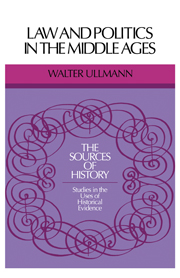Book contents
- Frontmatter
- Contents
- Dedication
- General Editor's Introduction
- Preface
- Abbreviations
- 1 Introduction
- 2 The Roman Law
- 3 The Scholarship of Roman Law
- 4 The Canon Law
- 5 The Scholarship of Canon Law
- 6 Non-Roman Secular Law
- 7 Governmental Doctrines in Literary Sources
- 8 The New Science of Politics
- Select Bibliography
- Index
- Frontmatter
- Contents
- Dedication
- General Editor's Introduction
- Preface
- Abbreviations
- 1 Introduction
- 2 The Roman Law
- 3 The Scholarship of Roman Law
- 4 The Canon Law
- 5 The Scholarship of Canon Law
- 6 Non-Roman Secular Law
- 7 Governmental Doctrines in Literary Sources
- 8 The New Science of Politics
- Select Bibliography
- Index
Summary
This book may fairly claim to be one of the first attempts to present the principal sources of medieval political ideas in an integrated and coherent manner. That the study of political ideas in the Middle Ages has been growing in recent years is due partly to the analysis of sources which have not before been considered proper bases or channels for conveying political ideas, partly to the better and more easily available editions of these sources, and partly to the realization that for the earlier medieval period ‘political’ or governmental ideas were frequently enough embodied in unexpected repositories, such as annalistic records, the numerous Gesta of kings, popes, emperors, etc., inauguration rituals, doxological and symbolic compendia, in sermons, tracts, epistolary communications, no less than in the law and the charters of rulers, municipal statutes, chancery regulations and practices, and so on. If to these are added the formal academic lecture, the severely scholarly commentary, the biblical exegesis, the monographic literature on specific topics, the books instructing young princes in the art of government, one will perhaps realize what an enormous amount of source material is at the disposal of the historian who wishes to extract relevant principles of government from this variegated material.
The systematization of concepts and doctrines which can be abstracted from the concrete manifestations of governments, presupposes some familiarity with the law, its creation and application. For it is increasingly recognized that the so-called political ideas in the Middle Ages are in reality governmental principles conceived, elaborated, applied and modified (or abandoned if necessary) by the governments themselves.
- Type
- Chapter
- Information
- Law and Politics in Middle Ages , pp. 11 - 16Publisher: Cambridge University PressPrint publication year: 1976

